COVID-19 has adversely impacted the well-being of people in every corner of the world, both as a health matter and an economic one. Those at the bottom of the socio-economic ladder are suffering the most, and within that group, migrants and refugees have been hit especially hard, including in Turkey.
The Turkish government does not provide separate statistics for the number of refugees that have contracted COVID-19, but most Syrian refugees live in densely populated urban settings with high rates of infection. It is widely recognized that the pandemic has affected their lives doubly: good hygiene is hard in crowded households, and the outbreak has made it harder to meet basic needs and access to livelihood opportunities. This picture is likely to worsen given the toll that the pandemic is taking on the Turkish economy.
Turkey has reported more than 170,000 cases, and has fortunately managed to avoid the high number of deaths faced by Italy and Spain. In early May, the government announced a program for the gradual and phased re-opening of the country. However, like in many other countries, getting Turkey back on its feet will be a challenge. A robust recovery will be further complicated by a weak economy and fragile domestic political scene.
To stave off the worst effects of the pandemic, Turkey and the European Union should revisit their March 2016 deal, intended to stop the flow of refugees and migrants from Turkey into Europe. Though the deal has faced criticism, it nevertheless provided the basis for cooperation (little publicly acknowledged) that has helped to relieve some of the burden on Turkey and improve the lives of refugees. The deal is due to expire in 2021, but the precarious circumstances created by COVID-19 lend urgency to revisiting the deal sooner. Europe should increase funding to help Turkey support refugees, and should adopt policies (including through its trade policy) to improve refugees’ access to livelihood opportunities. The Global Compact on Refugees (GCR) — which Turkey and all EU member countries, except Hungary, have signed — offers an ideal framework already.
What was the March 2016 deal about?
The primary objective of the Turkey-EU deal was to curb the sudden surge of irregular crossings into Greece in 2015 and 2016. Turkey increased border security, and Greece was allowed to return “all new irregular migrants” to Turkey. In return, the EU promised Turkey two tranches of 3 billion euros in grants, to support the refugees and enhance border security. Additionally, to encourage regularized paths to asylum, the deal envisaged the resettlement of one registered asylum seeker from Turkey for each irregular migrant returned from Greece. Finally, Turkey’s EU accession process was also to be re-energized through a visa liberalization program, and a new chapter in the membership negotiation process was opened.
The deal was effective both in terms of improving the EU’s border security concerns and sharing some of Turkey’s burden in meeting the needs of the refugees. The number of illegal crossings across the Aegean Sea dropped dramatically, from 885,000 in 2015, to about 42,000 in 2017. Officials from both sides cooperated in financing projects to support the needs of refugees and host communities under the Facility for Refugees in Turkey (FRIT). These funds have provided direct financial support to 1.7 million of the most vulnerable refugees, as well as enhanced educational facilities and capacity, healthcare, and livelihoods through numerous language and vocational training programs. So far, all 6 billion euros have been committed by the EU, with 4.7 billion euros contracted and 3.4 billion euros disbursed.
Despite serving the interests of both parties, the deal faced criticism. In Europe, some argued that the deal undermined international refugee law and lacked a robust humanitarian focus by giving too much leverage to the Turkish government. Periodic threats from Turkey to “open the borders” and let refugees stream towards Europe exacerbated these concerns and fueled displeasure towards the deal across the political spectrum. In Turkey, the greatest criticism came from government officials, who found the funds sorely inadequate compared to the public resources allocated to supporting the refugees, recently put at $40 billion. Additionally, Turkey complained about the slow disbursement of the funds and the EU’s preference to allocate the funds to U.N. agencies and nongovernmental organizations, rather than directly transferring them to state institutions. Finally, the failed coup attempt of July 2016 and the subsequent democratic backsliding blocked any progress towards visa liberalization and re-energizing of Turkey’s accession process.
Nevertheless, this pragmatic cooperation should not be taken for granted and deserves to be revamped. This is especially important considering the escalation of the conflict in Idlib, Syria in late February, which threatened the mass influx of close to one million Syrians into Turkey. Turkish President Recep Tayyip Erdoğan announced that Turkey would stop controlling outflows from its western borders, sparking a crisis with the EU. As a result, an estimated 12,000-25,000 refugees, asylum-seekers, and migrants from 29 countries gathered on the border with Greece. Greece responded by closing its borders, with strong operational and political support from the EU, and temporarily suspended asylum applications. On March 9, shortly after the crisis began and following a meeting between President Erdoğan and European Commission President Ursula von der Leyen in Brussels, both sides reiterated their commitment to the deal and expressed interest in improving it. Since then, all migrants have been evacuated from the border area on the Turkish side and were transported to their previous host cities in Turkey, after a two-week quarantine. Those who crossed the Greek border were put in camps, and the EU sought to expedite the resettlement of unaccompanied minors.
COVID-19 and the current refugee situation in Turkey
Turkey hosts the largest number of refugees in the world. There are close to 3.6 million refugees in Turkey, compared to 2.9 million in all of Europe. They are joined by an estimated 370,000 asylum seekers and refugees from Afghanistan, Iraq, Iran, Somalia, and elsewhere. Even if their “temporary protection” status enables them to enjoy access to a range of free public services, including education and health care, their lives are marked by deep precarity. The pandemic has exacerbated this vulnerability.
Crowded living quarters, poor sanitary conditions, food insecurity, and insufficient access to health services — as well as to online education for children — are particular factors that have heightened the impact of COVID-19 on refugees. One study found that 63% and 53% of those surveyed encountered difficulties in reaching food and in meeting hygiene conditions, respectively. Another 48% and 65%, respectively, reported problems in accessing online education and paying their rent or utility bills. This picture is further exacerbated by a dramatic drop in access to work. According to another survey, 69% of refugees have reported a loss of employment while many Syrian-owned businesses have suspended their activities partially or fully.
Thus, the conditions facing refugees in Turkey has deteriorated from their already fragile state, even with the deal helping to meet their basic needs. Prior to the pandemic, an estimated one million Syrians were informally employed under very precarious conditions to make ends meet. The outbreak of COVID-19 has further aggravated this picture. The FRIT funds are at this point far from adequate in meeting refugees’ basic economic needs.
The need for a new deal
Revamping the deal will be challenging given the poor state of EU-Turkey relations, but focusing on two elements will make for a good start.
First, because the COVID-19 pandemic creates a double emergency for refugees — in avoiding contracting the virus on the one hand, and continuing to access basic needs and livelihoods on the other — Syrian refugees have seen their vulnerabilities significantly increase. With Turkey’s own resources strained, it will be important for the EU to renew funding for FRIT and continue its direct financial support for refugees. Also, cash transfers conditional on school enrollment are critical to dissuade parents from resorting to negative coping mechanisms and to keep their children at school.(Education has been conducted online in recent months, but schools will start to re-open.)
Secondly, because the traditional refugee-response system — based on finding durable solutions to forced displacement through local integration, resettlement, and repatriation — is broken, an ever growing number of refugees have found themselves in protracted situations without access to durable solutions. Hence, creating opportunities for enhancing refugee self-reliance and the resilience of host communities has acquired new importance, as recognized by the GCR adopted in December 2018.
The devastation caused by the pandemic provides a special impetus to incorporate this perspective. The Economist and the U.N. have noted that the pandemic risks undoing the gains made against poverty in the past two decades. In Turkey, the pandemic’s adverse impact on employment opportunities for all risks further escalating public resentment towards refugees and heightening the likelihood that refugees will resort to irregular migration to Europe. Adopting the GCR’s call to “promote economic opportunities, decent work, job creation and entrepreneurship programs for host community members and refugees” would help create a win-win-win outcome benefiting refugees, the host country, and the EU.
The EU could extend preferential trade arrangements for Turkey, especially for goods and sectors with high refugee participation, and grant concessions that would enable Turkey to expand its agricultural exports to the EU tied to the formal employment of Syrians. Turkey has been in an economically beneficial customs union with the EU since 1995, but it only covers industrial goods. Thus, exports of fresh fruits and vegetables, together with the agricultural portion of industrially-processed agricultural goods, are taxed and face regulatory restrictions, such as quotas. For this reason, agricultural exports to the EU have lagged significantly behind industrial exports, leading to a loss of welfare. Both the agricultural sector and industrial sector processing agricultural goods suffer from labor supply shortages. This shortage is often filled by Syrian workers, who work under adverse and precarious conditions. Chambers of commerce and municipalities would be well placed to assist with the integration of refugees into local economies in this regard.
It’s time to act
Ultimately, EU-Turkey cooperation that strengthens the chances of refugees meeting their basic needs and that improves their self-reliance through decent and sustainable work is in the interest of all parties. For Turkey, implementing these policy recommendations would help refugees stand on their own feet, become productive members of Turkish society, defuse growing public resentment, and reduce the likelihood of crime out of economic desperation, while at the same time sparking economic growth.
For the EU, this plan would reduce the likelihood of refugee secondary movements and the need to keep raising funds for humanitarian assistance as refugees become more independent, funds that will likely be in even shorter supply amid a severe global economic downturn. Refugees would benefit by being able to replace informal employment with access to sustainable livelihoods and enjoy the dignity that comes with self-reliance.
The benefits of updating the EU-Turkey deal are clear, as well as the need to do so. All that remains is the willingness to act.
The Brookings Institution is committed to quality, independence, and impact.
We are supported by a diverse array of funders. In line with our values and policies, each Brookings publication represents the sole views of its author(s).

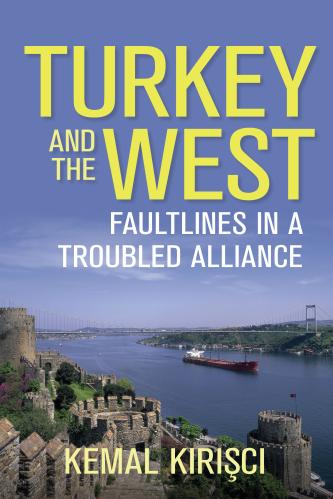
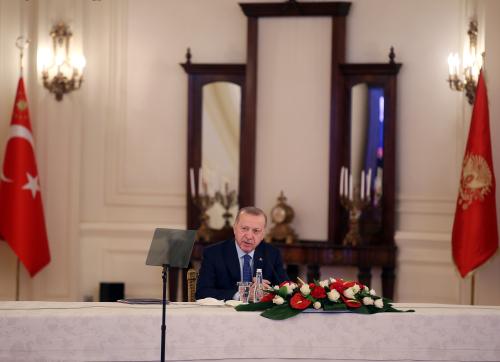
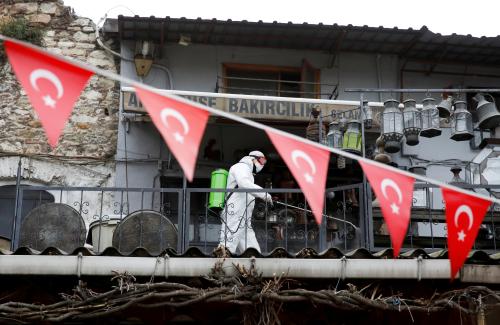
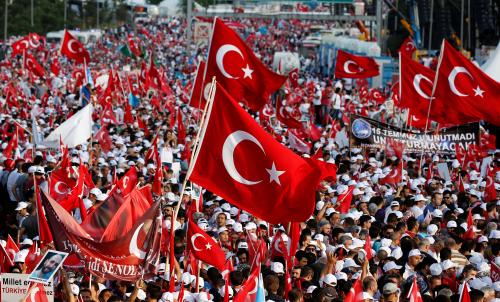



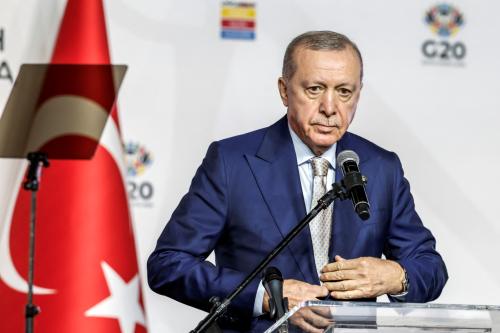
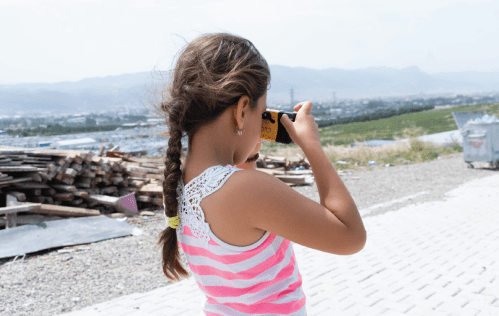
Commentary
As COVID-19 worsens precarity for refugees, Turkey and the EU must work together
June 11, 2020